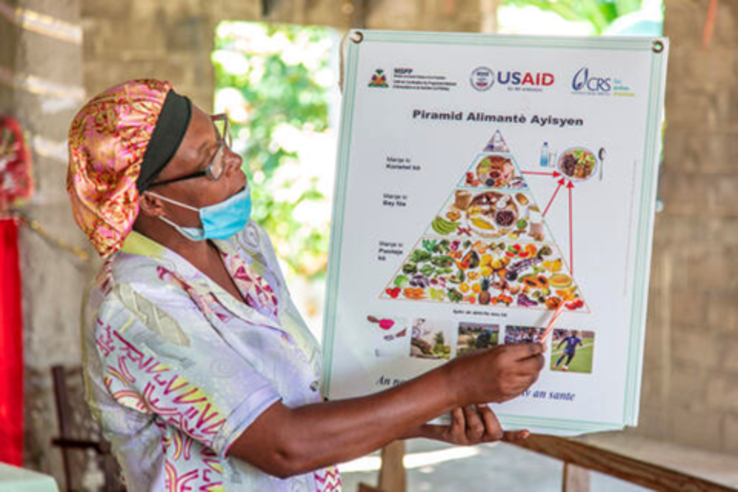Request support on coordination, information management, integration for nutrition outcomes or technical nutrition in emergencies assistance.
التماس الدعم لتنسيق التغذية وإدارة المعلومات والتغذية في حالات الطوارئ
Demander un appui pour la coordination de la nutrition, la gestion de l'information et la nutrition dans les situations d'urgence
Buscar apoyo para la coordinación de la nutrición, la gestión de la información y la nutrición en situaciones de emergencia
Solicite apoio para coordenação em nutrição, gestão de informação e nutrição em emergências
Strengthening nutrition efforts after the 2021 Haiti earthquake
Children are especially vulnerable to malnutrition, illness, and death during emergencies. They are highly dependent on their caregivers, their immune systems are still developing, and their bodies and brains depend on good nutrition for healthy growth and development. So when a powerful 7.2 magnitude earthquake struck Haiti on August 14, 2021, Infant and Young Child Feeding (IYCF) became top priority for emergency responders.
One way to protect infants and young children in emergencies is to encourage mothers to breastfeed in order to minimize the risks associated with artificial feeding in emergencies. However, in the aftermath of the earthquake, gaining humanitarian access was challenging, security was a huge concern, and national authorities and humanitarian partners were stretched thin trying to meet the swelling humanitarian needs. This made it difficult to reach mothers and their children easily.
There was also a lack of technical capacity within Haiti to support Infant and Young Child Feeding activities in Emergencies (IYCF-E), which is why the Nutrition Cluster Coordinator – with support from the UNICEF Regional Office – requested support from the GNC Technical Alliance.
The nutrition situation for infants and young children in Haiti was challenging even before the disaster. The number of children exclusively breastfed was low – only 40% of children under six months and 15% of children ages four to five months were breastfed. Additionally, 25% of children relied on bottle-feeding, which put their lives at risk when the water supplies parents relied on to feed them became contaminated or damaged in the earthquake (Demographic Health Survey 2016-2017).
On top of that, only one in four children aged six to 23 months maintained a diet with enough diversification – containing at least four food groups – and only 11% met the World Health Organisation’s minimum intake requirements.
For this reason, the GNC Technical Alliance was asked to provide in-country technical assistance and capacity building to the government, UNICEF’s regional office, the nutrition cluster and its partners in Haiti – including local and international non-governmental organizations.
Claude Sabwa – a French-speaking nutrition advisor from Save the Children International – was sourced to provide in-country and ongoing technical support for eight weeks. During that time, Claude provided a tremendous amount of support, including:
- Strengthening the IYCF-E Technical Working Group’s (TWG) coordination
- Conducting IYCF-E training for advisors and managers at a national level and developing a 3-day IYCF-E training session for frontline staff.
- Revising and updating the guidelines and tools for Baby Nutrition Counselling Points (PCNB)
- Developing guidelines for the management of Breastmilk Substitutes (BMS) and a Monitoring & Evaluation toolkit
- Reviewing IYCF-E messages (Joint Statement) and drafting IYCF-E messages to reach affected populations and strengthening the channels and media used to reach them
- Mapping local IYCF-E capacity in Haiti to inform an effective IYCF-E response
Reflecting on his experience, Claude says “the greatest achievement was conducting the 3-day online IYCF-E orientation session and supporting the development of the 3-day IYCF-E training session for the frontline workers, which allowed to improve quality of non-breastfed intervention in the targeted areas.”

But Claudes’ deployment was not without its challenges. An arduous visa process and lack of flight options from DR Congo to Haiti reduced Claude’s initial four weeks of in-country support to only two. This meant he didn’t have time to carry out the planned workshop aimed to strengthen linkages between sectors – health, nutrition, child protection, education, and WASH – around IYCF-E.
Once in Haiti, serious security threats prevented Claude from visiting all the areas he needed to asset the quality of the IYCF-E response and collect case studies. Claude was deployed a second time in April 2022 in order to gather this important information.
However, despite all the challenges, Claude says he saw positive results and IYCF-E strengthened in affected areas in Haiti – thanks in large part to the high level of support from the Nutrition Cluster and strong engagement among nutrition partners.
Learn more about the GNC Technical Alliance’s Global Thematic Working Group on Infant and Young Child Feeding in Emergencies.
Need technical support in this area? Get in touch to request support from an advisor.
Photo Credit:
© UNICEF/UN0589507/Rouzier
